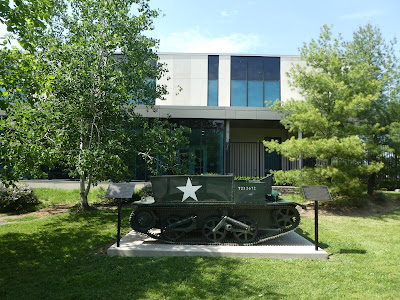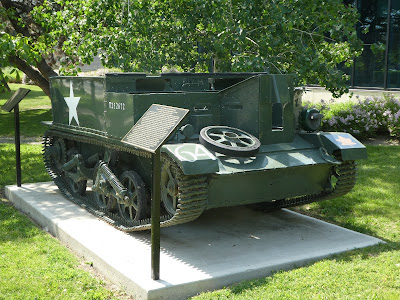Location: City of Toronto N 43.60430 W -79.50218
70 Birmingham Street, in front of the armoury.
This memorial is a dedicated to the Toronto Scottish Regiment and is found in front of their home, the Captain Bellenden Hutcheson, VC Armoury. The memorial consists of restored Universal "Bren Gun" Carrier from World War II, and two plaques which tell the story of the Regiment and its battle honours.
The Toronto Scottish Regiment is a Primary Reserve infantry regiment with companies in Etobicoke and Mississauga.
As the Army’s primary war-fighters and the core of the combat arms team, infantry soldiers are responsible for closing with and destroying the enemy. Supported by the artillery, regiments of armour and the combat engineers, infantry soldiers are capable of operating anywhere in the world in any environment - arctic tundra, mountains, jungle or desert - and in any combination of arms, including airmobile and amphibious operations.
The following plaques tell their story:
Marker text:
The Toronto Scottish Regiment (M.G.) Monument
During the Second World War, the regiment mobilized a machine gun (M.G.) battalion
for the 1st Canadian Division. Following a reorganization in 1940, the battalion
was reassigned to the 2nd Canadian Division, where it operated as a Support Battalion,
providing machine-gun detachments for Operation Jubilee, the raid on Dieppe, France
in 1942. With an additional company of heavy mortars, it operated in support of the
rifle battalions of the 2nd Division in Northwest Europe from July 1944 to VE Day.
Soldiers of the regiment also had the honour of mounting the King's Guard at
Buckingham Palace in April 1940. Back in Canada a 2nd Battalion served in the
reserve army. In 2000, the regiment added a second title in recognition of Her
Majesty The Queen Mother's long association a Colonel-in-Chief, a position she
had held since 1937. The name of the regiment changed to
The Toronto Scottish Regiment (Queen Elizabeth The Queen other's Own).
This monument recognizes all Canadians from the Second World War era who deployed
overseas, sacrificed their lives, suffered physical or mental injury, or were the families
who supported our soldiers from the home front. In addition, this monument recognizes
the role of the Canadian Armed Forces in the liberation of France, Belgium and The
Netherlands and the triumph of all that is good. It was made possible with great
appreciation to The Toronto Scottish Regiment Foundation and Senate, Max Franzini
Family, Lieutenant-Colonel Garry Moore Family, Steve Ernewein Family, Michael Carlson
and Family, especially Honorary Colonel Helen Vari, C.M., CLH, OONM, LL.D, LHD,
and the George and Helen Vari Foundation and is dedicated to the
Honourable George W. Vari, P.C., C.M.
The Toronto Scottish Regiment
(Queen Elizabeth The Queen Mother's Own)
Universal "Bren Gun" Carrier.
Universal Carriers such as the one displayed on this monument were deployed
widely by Canada and British Commonwealth forces during the Second World War.
They were typically employed for transporting personnel, equipment and support
weapons, and were used as machine gun platforms for the .303 calibre Vickers
medium machine gun and the .303 calibre Bren Gun. The Toronto Scottish Regiment
(Queens Elizabeth The Queen Mother's Own), a machine gun and support regiment of
the 2nd Canadian Division, 2nd Canadian Corps during the Second World War,
employed and relied heavily on these carriers. They were an essential Allied
resource for the liberation of Northwest Europe against Nazi forces.
The Toronto Scottish Regiment (Queen Elizabeth The Queen Mother's Own), in the
beginning, was known as the 75th Battalion. It was raided in 1915 when Lieutenant
Colonel SG Beckett undertook an assignment to recruit a battalion for the Canadian
Expeditionary Force. The Battalion served in France and Belgium during the Great
War, winning a total of 16 Battle Honours. Upon its arrival home in June 1919 the
75th Battalion was dismissed and on 1 September 1921 it was designated
The Toronto Scottish Regiment. On 3 September 1939, two days after the Nazi forces
invaded Poland, The Canadian Government ordered the mobilization of units.
The Regiment was the first complete Canadian unit to land in the United Kingdom
during the Second World War. With final victory, the Regiment had earned
a total of 21 Battle Honours, and had suffered 425 casualties.

















No comments:
Post a Comment
Note: only a member of this blog may post a comment.